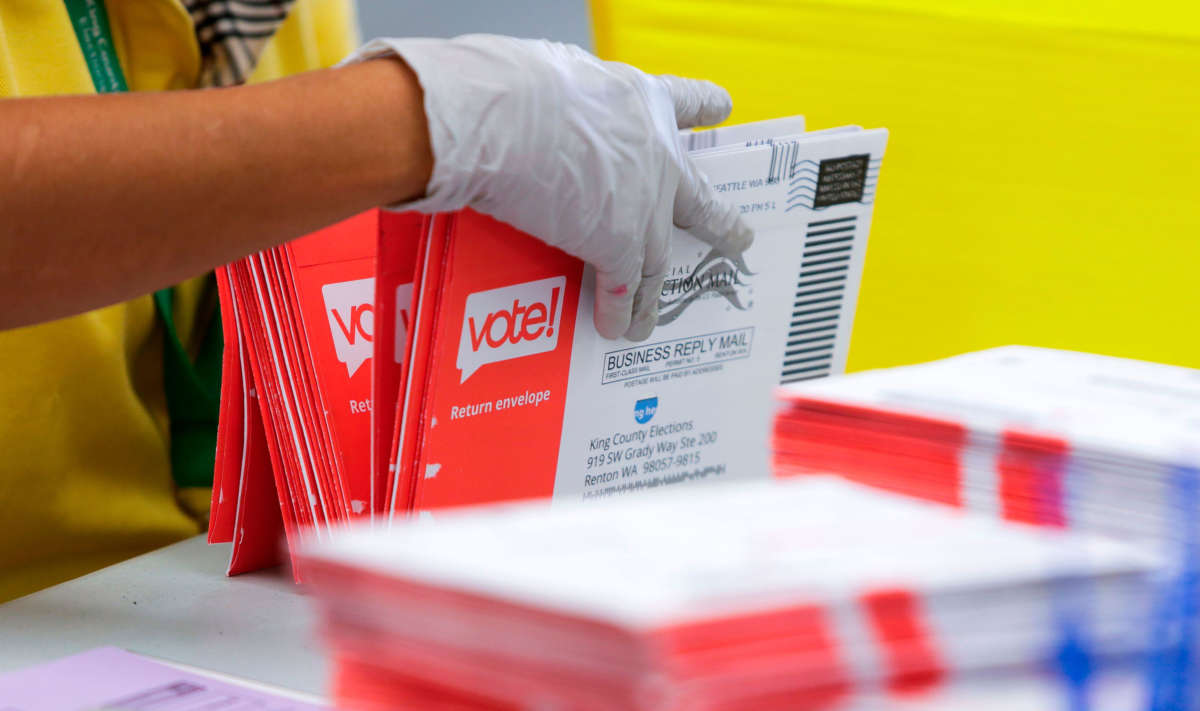Did you know that Truthout is a nonprofit and independently funded by readers like you? If you value what we do, please support our work with a donation.
Voting by mail has become a political issue in this election year, thanks in part to many errant and unverifiable statements by President Donald Trump. But a new poll demonstrates most Americans still trust the practice of voting by mail.
Only 31 percent of respondents in a Politico/Morning Consult poll released on Wednesday say the United States shouldn’t allow mail-in voting under the mistaken belief that it “jeopardizes election security” — a likely outcome of viewpoints widely expressed by Trump and others in his campaign over the past several months that voting by mail is rife with fraud.
However, the vast majority of respondents in the poll, 58 percent, when asked their opinion about mail-in voting said that it should be allowed to let voters take part in this year’s elections in order to prevent or slow down the spread of coronavirus while Americans exercise their constitutional right to vote.
Those who say they belong to or align with the Republican Party are more likely to be wary of mail-in voting, with 57 percent of GOP voters saying they’re against the practice for this year’s races. On the other side, 81 percent of Democratic-leaning voters say the practice should be allowed for anyone with concerns about contracting COVID-19 while trying to cast their votes this year.
Every state in the country allows some form of mail-in (or absentee ballot) voting, but not every state this year will allow voters to use a mail-in ballot if their reason for doing so is to prevent exposure to COVID-19 or limit the spread of the disease.
Sixteen states require an excuse to obtain an absentee ballot, such as being elderly and unable to make travel arrangements to the polling place, or being out of town on business or vacation and thus, too far away to make it to the polls in their jurisdictions on Election Day. In seven of those states, fear of catching a highly contagious disease like COVID-19 is not yet an acceptable excuse for obtaining absentee ballots.
Other polling has shown strong support for allowing “no excuse” absentee ballot voting across the entire nation during the pandemic. A Pew Research poll from last month, for example, found that 65 percent of Americans would favor giving every voter the chance to cast their ballots by mail, even in states that don’t typically allow such exceptions to be recognized.
Except for a rare instance this week in which he said that mail-in voting was fine in his home state of Florida, Trump has made several statements since the start of the pandemic in the U.S. warning against the practice, suggesting despite plenty of evidence to the contrary, that voting by mail would invite fraud.
Just last week, the president claimed in a tweet that “2020 will be the most INACCURATE & FRAUDULENT Election in history,” adding that consideration for delaying the election should be given “until people can properly, securely and safely vote.”
Trump’s messaging on mail-in voting is not consistent with reality — there’s no evidence of widespread fraud with those ballots — and it also breaks away from the talking points his own campaign is making in swing states, where supporters of the president are actually being encouraged to vote by mail.
As far as how Americans view the president’s bogus warnings, the Politico/Morning Consult poll found that most did not agree with him. Just 7 percent of respondents in the poll said that the election should be delayed, while 86 percent said the election should go on as scheduled — with 52 percent saying that most Americans should vote by mail rather than in person.
Trump is silencing political dissent. We appeal for your support.
Progressive nonprofits are the latest target caught in Trump’s crosshairs. With the aim of eliminating political opposition, Trump and his sycophants are working to curb government funding, constrain private foundations, and even cut tax-exempt status from organizations he dislikes.
We’re concerned, because Truthout is not immune to such bad-faith attacks.
We can only resist Trump’s attacks by cultivating a strong base of support. The right-wing mediasphere is funded comfortably by billionaire owners and venture capitalist philanthropists. At Truthout, we have you.
Truthout has launched a fundraiser, and we have only 48 hours left to raise $22,000. Please take a meaningful action in the fight against authoritarianism: make a one-time or monthly donation to Truthout. If you have the means, please dig deep.
